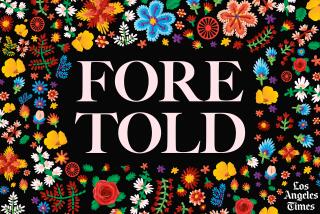ALBUM REVIEWS : Tapping Into Moroccan Roots
- Share via
It doesn’t take an ethnomusicologist to recognize that there are many connections between jazz and the pre-Industrial music of the world, from improvisation to the uses of rhythm and melody.
Efforts to explore those connections on a creative level have often floundered on the shoals of superficiality. But two albums from artists who have, in effect, gone to the source to find a nexus, demonstrate the adaptability and interactivity of jazz. Both Randy Weston and Pharoah Sanders have found common cause with the Gnawas, master musicians of Morocco and descendants of slaves brought to North Africa from the sub-Sahara area in the 16th Century.
RANDY WESTON
“The Splendid Musicians of Morocco Featuring Randy Weston” Antilles Records , ** 1/2
Weston, an important pianist-composer who has never quite received the public acknowledgment that he has from musicians, plays a dual role here as producer and performer. Concerned primarily with presenting the Gnawa music in its purest state, he devotes most of the album to two long collections of traditional material. The music is fascinating--strange, at times, to Western ears, with its hypnotic rhythmic repetitions and unusual vocal timbres, but never less than gripping, and clearly the expression of a complex musical culture.
On one track, another traditional piece titled “Chalabati,” Weston adds his piano to the ensemble. A bit tentative at first, and never quite completely integrated into the music, he nonetheless occasionally manages to find convincing common cause between the fixed tones of his instrument and the sliding, organic textures of the Gnawa masters.
MALEEM MAHMOUD GHANIA WITH PHAROAH SANDERS
“The Trance of Seven Colors”, Island Records , ***
This is a remarkable coming together. Sanders’ Coltrane-influenced free soloing, modally based and rich with vocalized expressions, seems to fit perfectly into the mesmerizing rhythms of Ghania and his group of master Gnawa musicians. On one work--”Peace in Essaouira (For Sonny Sharrock)”--he reverts to more familiar jazz cadenza style with a long, declamatory solo accompanied only by percussion shakers in the background.
On other pieces--including a collaborative effort by Sanders and Ghania--Sanders generally stands aside and allows the music to build, its energy gradually increasing until he steps in, a shaman with a tenor saxophone, urgently propelling the communal music-making process to a more intensely hypnotic level of expression.
Albums are rated on a scale of one star (poor) to four s tars (excellent).
More to Read
The biggest entertainment stories
Get our big stories about Hollywood, film, television, music, arts, culture and more right in your inbox as soon as they publish.
You may occasionally receive promotional content from the Los Angeles Times.










